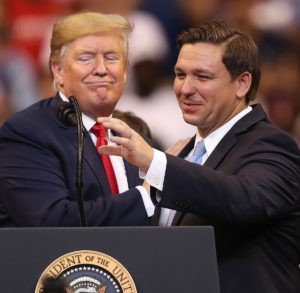As Congress and the country focus on Donald Trump’s incoming administration and cabinet picks, Americans are paying less attention to outgoing leaders such as Mitt Romney, the principled Mormon Republican senator whose six-year term featured regular critiques of both Trump and the pro-MAGA evangelical leaders who’ve embraced him.
“God has blessed America because America is good,” Romney said in his farewell address last week.
“I have been in public service for 25 years. I have learned that politics alone cannot measure up to the challenges we face,” he added. “A country’s character is a reflection not just of its elected officials but also of its people. I leave Washington to return to be one among them and hope to be a voice of unity and virtue. For it is only if the American people merit his benevolence, that God will continue to bless America.”
Romney condemned “the scourge of partisan politics (that) has frustrated repeated efforts to stabilize our national debt” but praised a bipartisan group of senators who worked together to pass legislation on infrastructure, electoral reform, gun safety and marriage.
“God has blessed America because America is good.”
His generous and hopeful speech contrasted with his 2023 biography, A Reckoning, which blasted the GOP and his fellow Republicans, including Trump, former Vice President Mike Pence (a sycophantic Trump “lap dog”), Vice President-elect JD Vance, Sen. Josh Hawley and the evangelicals who helped elect them.
Romney says his growing disillusionment and alienation from the GOP is due to an ideological “heist” in which his formerly principled party has “atrophied,” been “radicalized,” and seen itself reduced to “identity and grievance and tribal allegiances.” The conspiratorial form of political warcraft promoted by former House Speaker Newt Gingrich is now the norm.
In 2023, Romney told biographer McKay Coppins: “A very large part of my party really doesn’t believe in the Constitution.”
Coppins explains: “The elected leaders of his party had forgotten how to say no to their base. They’d forgotten how to do unpopular things simply because they were right.”
Romney is quoted in the biography: “It’s almost like you take what is praiseworthy and of good report and you say, ‘Let’s attack that!’ I don’t recognize my party in some respects.”
Criticized as a flip-flopper during his 2012 presidential campaign, Romney was surprised by the “brazenness,” “cravenness and cowardice” that led fellow members of Congress to abandon their principles and fall in line with Trump.
“Trump wasn’t just erratic or stupid or immoral or mean … he was hostile to the very underpinnings of American democracy.”
“Trump wasn’t just erratic or stupid or immoral or mean … he was hostile to the very underpinnings of American democracy,” said Romney, who joked about Trump at a black-tie banquet: “Some people find it hard to understand why so many evangelical Christians support Donald Trump, but let’s remember: Donald Trump is the only man who felt so strongly about his marriage vows that he paid $130,000 not to have sex with a porn star.”
In 2021, Romney became the first senator in history to vote to remove a president of his own party, saying Trump had “attempted to corrupt the election” and “violated his oath of office by failing to protect the Capitol, the vice president, and others in the Capitol.”
Here’s how Romney views Republican and evangelical leaders who are on board for the second Trump administration.
Vice President-elect JD Vance. “I don’t know that I can disrespect someone more than JD Vance,” said Romney, who read Vance’s Hillbilly Elegy and hosted the author at his annual Park City summit in 2018. Then Vance changed.
“In 2021, Vance decided he wanted to run for Senate, and reinvented his entire persona overnight,” Coppins writes in Romney’s biography. “The speed of the MAGA makeover was jarring.”

Sen. Josh Hawley (R-Mo.) gestures toward a crowd of supporters of Donald Trump gathered outside the U.S. Capitol to protest the certification of President-elect Joe Biden’s electoral college victory Jan. 6, 2021, at the US Capitol in Washington, DC. (Francis Chung/E&E News and Politico via AP Images)
Sen. Josh Hawley. Romney confronted Hawley on Jan. 6, 2021, as Hawley promoted Trump’s lies of a rigged election and sought to overturn the will of voters. Hawley later defended his actions on a Focus on the Family broadcast, saying, “It’s an honor to be able to stand for the Lord.” But Romney isn’t buying it.
As Trump supporters stormed the Capitol on Jan. 6, Romney yelled at Hawley: “You’re the reason this is happening!”
“Josh Hawley is one of the smartest people in the Senate, if not the smartest,” said Romney, but he condemned Hawley’s “oily disingenuousness” in teaming up with Sen. Ted Cruz to do Trump’s bidding.
“They were making a calculation that put politics above the interests of liberal democracy and the Constitution,” said Romney, who says Hawley and Cruz were “complicit in an unprecedented attack against our democracy.”
Romney spoke out against Hawley after the Capitol was cleared of insurrectionists and the Senate reconvened. “The best way we can show respect for the voters who are upset is by telling them the truth!”
Sen. Mike Lee. Romney had many moral conflicts with evangelicals, but he also differed with his fellow Utah senator and fellow member of the Church of Jesus Christ of Latter-day Saints.
“After initially opposing Trump in 2016, the senator pivoted abruptly, distinguishing himself as one of Trump’s most loyal lackeys,” writes Coppins. Lee once said he was spending “14 hours a day” supporting Trump’s efforts to overturn the 2020 election.
Lee even gave a speech comparing Trump to Captain Moroni in the Book of Mormon. Latter-day Saints found the comparison “blasphemous.”
Mike Huckabee. Trump has named the former Arkansas governor his ambassador to Israel, but Romney sees him as a “huckster” whose aw-shucks persona conceals a fragile ego and petty ruthlessness.
When Romney and Huckabee were dueling for the 2016 presidential nomination, Huckabee joined fellow evangelicals in disparaging Romney’s faith, saying, “Don’t Mormons believe that Jesus and the devil are brothers?”

Donald Trump introduces Florida Gov. Ron DeSantis during a homecoming campaign rally Nov. 26, 2019, in Sunrise, Fla. (Photo by Joe Raedle/Getty Images)
Gov. Ron DeSantis. Romney thinks DeSantis is smart and respects his genuine patriotism and scandal-free marriage and personal life, but said his culture war “schtick” is hard to take and claimed he possesses many of the same “odious qualities” that define Trump.
The Religious Right. During Romney’s 2008 presidential run, he sat for an “inquisition” with conservative evangelical leaders who grilled him on his record during his years as governor of Massachusetts.
These leaders condemned “Romney-care,” the state’s expansion of medical benefits to all citizens. Romney found it “ironic” that “saving human lives was seen by some as being disqualifying.”
Then Franklin Graham homed in on Romney’s lack of discrimination against LGBTQ people in one brief exchange:
Graham: “I cannot in good conscience support you in this campaign because you named two people who were gay to the court in Massachusetts.”
Romney: “I didn’t inquire about their sexuality.”
Graham: “Well, you should have.”
Baptists Richard Land and Jerry Falwell pressed Romney on Mormons’ beliefs, much like Dallas pastor Robert Jeffress would do during the 2012 presidential race. Jeffress, who now backs Trump, opposed Romney in 2012, calling on believers to instead nominate a “real Christian.”
Romney also describes his frustration with the Family Research Council’s Values Voter Summit, where his speech was followed by a rant from American Family Association’s Bryan Fischer, “a notorious Christian bigot” who said the Constitution’s First Amendment shouldn’t be applied to heretics like Mormons.
FRC’s Tony Perkins defended Fischer on “free speech” grounds, leaving Romney unpersuaded. “He didn’t invite a commie to speak,” Romney thought to himself.
In last week’s farewell speech, Romney criticized those “who would tear at our unity, who would replace love with hate, who deride our foundation of virtue, or who debase the values upon which the blessings of heaven depend.”
He also praised his wife, Ann, and his family: “She is my most trusted adviser, my indefatigable ally, the love of my life for 54 married years. Our five sons are just as loyal and are the source of profound pride, joy and 25 grandchildren.”
Romney also had warm words for his fellow senators: “Now, my biggest surprise in the Senate has been how much I enjoy the other senators — on both sides of the aisle. And the truth is that while I may not miss the Senate itself terribly much, the 10-minute votes that last an hour, the unknowable schedule of votes, the myriad meaningless votes, the absurd passion about the inconsequential votes. I will very much miss you, my fellow senators, for among you are some brilliant, some entertaining, some kind and generous and all patriotic. It is an honor to have been able to serve with you.”
Related articles:
Gerontocracy | Opinion by Jennifer Brown


